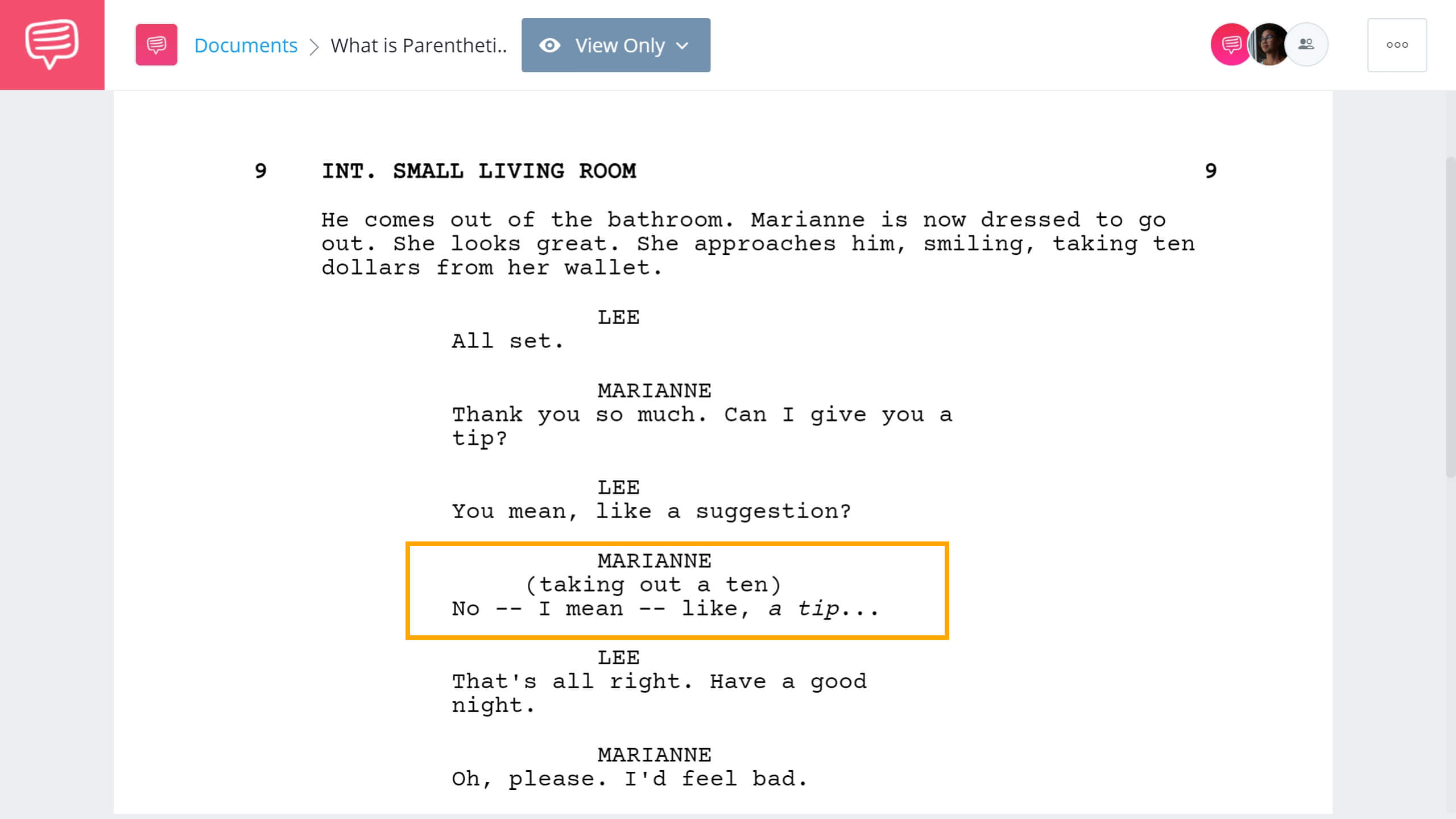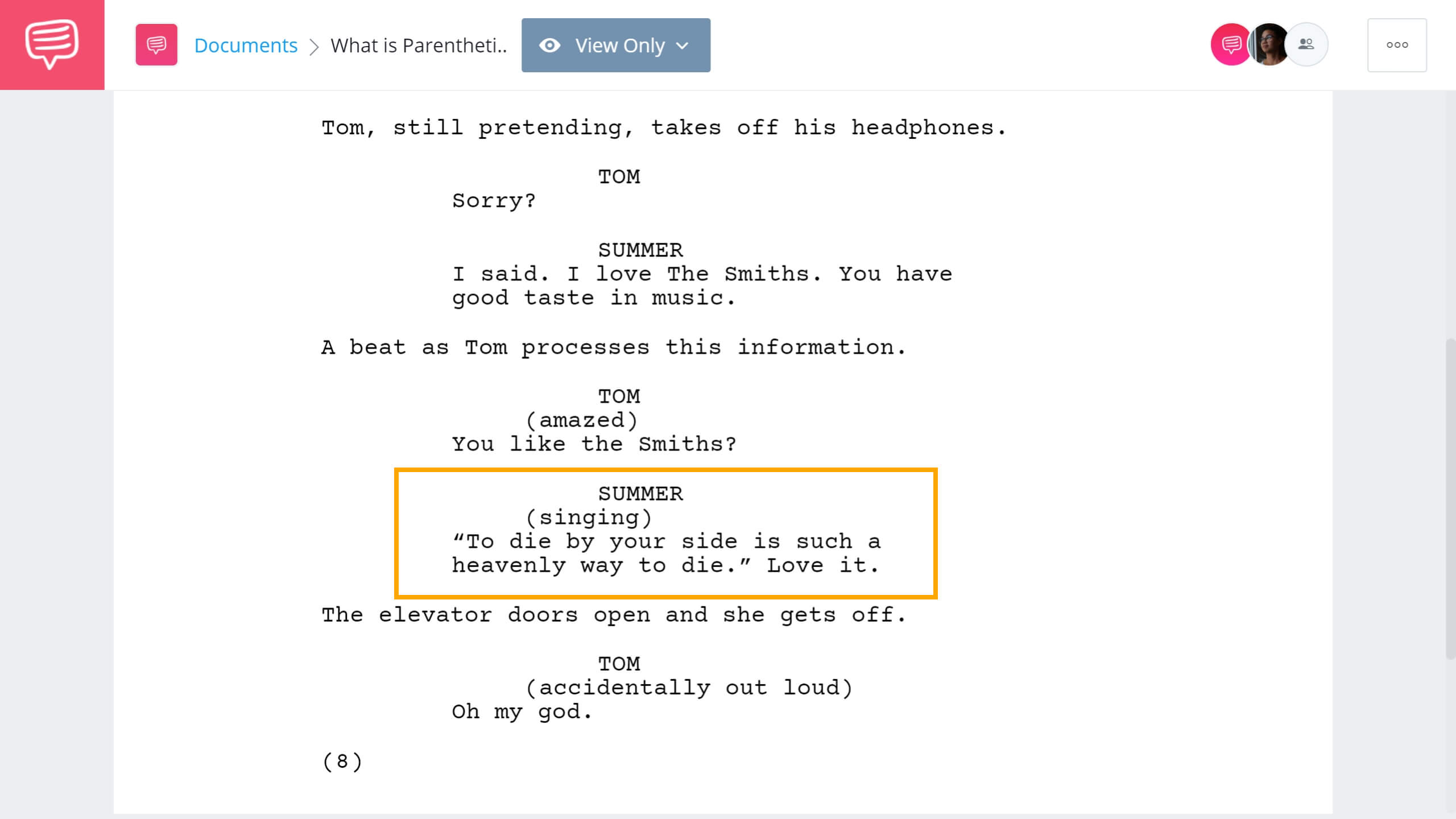Screenplays are meant to tell a cinematic story. This can be difficult, however, without the advantage of visuals. Screenwriters are stuck with using words to communicate highly cinematic scenes. One of the best tools they have to do this is the parenthetical.
Parentheticals allow screenwriters to fit in small, but vital information within a dialogue scene. Parentheticals can completely change how a scene reads and how a reader understands the story. What is a parenthetical in a script and how can you use it in yours? In this article, we’ll dive a bit deeper into parentheticals and take a look at a few common ways screenwriters use them.
What is a parenthetical in a script
What does parenthetical mean
Parentheticals are that can be used for a variety of reasons. Before we dive into those reasons, let’s take a look at the parenthetical definition to get a general understanding of the screenwriting device.
PARENTHETICAL DEFINITION
What is a parenthetical in a script
A parenthetical is a note or direction on how a particular line of dialogue or action is delivered by a character. Parentheticals often communicate emotion, action, or delivery within a screenplay’s dialogue. Parentheticals are used to move a plot forward and give the reader a clearer idea of what is occurring within the dialogue scene. It is not, however, a way for a screenwriter to direct or suggest the performance direction of a screenplay.
What is a parenthetical in a script used for:
- Communicating a character’s emotion
- Gestures
- Delivery of dialogue
What is a parenthetical in a script used for?
Clarify actions and gestures
Besides using action descriptions, screenwriters use parentheticals to clarify a character’s action or gesture as they deliver a line of dialogue. A character’s action can often change the meaning of a line of dialogue. For example, take a look at this scene from the Manchester by the Sea screenplay.
The word “tip” is used as a homonym in this dialogue scene. To clarify the way the character Marianne is using the word, a parenthetical is used. We brought the Manchester by the Sea screenplay into the StudioBinder screenwriting app to analyze the parenthetical in screenwriting further. Check it out by clicking the link below.
Manchester by the Sea screenplay parenthetical example script
As you can see, clarifying a gesture or action with a parenthetical can change a reader's understanding of a line of dialogue. If an action is not relevant to a specific line of dialogue, it can simply be written in an action description.
Related Posts
What is a parenthetical in a script used for?
Convey a character’s emotion
A very common reason screenwriters utilize parentheticals is to communicate to the reader the emotion that a character is conveying when delivering a line. On the page, emotion can be difficult to convey, but incredibly important to a dialogue scene.
For example, check out this parenthetical from the La La Land screenplay. In this video, you’ll see how the script translates to the screen performance of this scene. Specifically the parenthetical “(finally letting it out, fed up --)” is used to communicate the clear emotion of the dialogue.
La La Land • Parenthetical example script
While using parentheticals is an effective way to communicate a character’s emotion, it should be used sparingly. Afterall, as the screenwriter, you are not trying to direct a performance on the page. Parentheticals should only be used for emotions when it is important to the reader's understanding of the dialogue.
Parenthetical in screenwriting
Distinguish a character’s delivery
Not all delivery, however, is dependent on emotion. Sometimes delivery needs to be clarified based on how a line is audibly delivered. This can be for a character that is out of breath, whispering, or as in this example from the (500) Days of Summer screenplay, singing.
In this scene, parentheticals are used three times to communicate emotion and delivery. To clarify that summer sings the lyrics, a parenthetical of “(singing)” is used.
(500) Days Of Summer Parenthetical example script
Without the parenthetical, a reader might assume that Summer simply speaks the lyrics which makes her much less charming in the scene. Her singing causes the appropriate reaction from Tom.
A parenthetical in screenwriting is an incredible screenwriting tool that can tell a better story on the page. Screenplays are meant to tell a cinematic story which can be difficult without visuals. However, parentheticals can help screenwriters communicate vital information in an effective way.
UP NEXT
How to Start a Script
Now that you understand what a parenthetical is and how it can be used, it’s time to learn how to start a screenplay. In our next article, we take a look how you can start you script.


